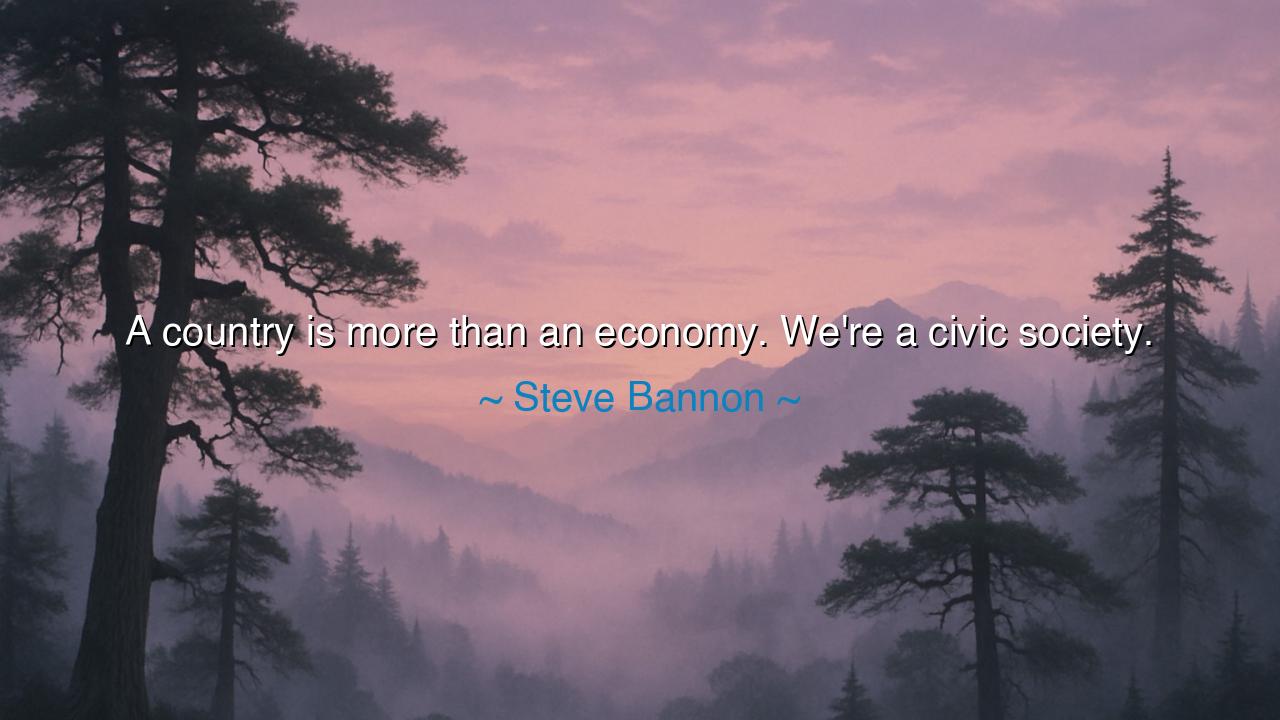
A country is more than an economy. We're a civic society.






Steve Bannon, a man who stirred both loyalty and controversy in his time, once declared: “A country is more than an economy. We’re a civic society.” Though brief, these words pierce to the heart of what it means to live as a people. They remind us that nations cannot be reduced to markets, trade balances, or the cold figures of finance. A country is not merely a ledger of wealth—it is a living union of human beings, bound together by laws, traditions, and shared responsibilities.
The meaning of this statement is profound. To call a country an economy alone is to strip it of soul, to make its citizens nothing but workers and consumers, valued only for their productivity. But to remember that we are a civic society is to honor the truth that we are also neighbors, parents, servants, leaders, and dreamers. A civic society recognizes duties as well as rights, belonging as well as freedom, service as well as gain. In these words lies a call: let not profit alone define the worth of a people.
History confirms this lesson. In ancient Athens, the wealth of trade and empire poured into the city. Yet Pericles, in his famous Funeral Oration, reminded the people that Athens was not great because of riches but because of its civic life—its democracy, its sense of participation, its citizens’ willingness to sacrifice for one another. It was this civic spirit, more than its silver mines or markets, that defined its glory. But when that civic spirit waned and greed overshadowed duty, the city fell into ruin. Thus we see: a country cannot live by economy alone.
Another example lies in the rebuilding of Europe after the Second World War. Entire nations lay in ashes, their economies shattered. If wealth alone defined them, they would have been declared dead. Yet they rose again, not by gold but by civic will—by communities banding together, by the vision of unity that created the European Union, by the Marshall Plan which recognized that mutual flourishing required mutual responsibility. Out of devastation, they rebuilt not only economies but societies, because they remembered that a nation is, first of all, its people.
Bannon’s words also carry a warning for our own time. Many nations exalt the economy above all else, treating growth as the supreme god and reducing citizens to mere cogs in its engine. Yet when citizens are treated only as workers or numbers, despair grows, alienation spreads, and the very bonds of civic society begin to fray. For wealth without solidarity breeds division, and prosperity without community is an empty prize.
The lesson is clear: each of us must remember that we are part of something larger than profit. To be a member of a civic society is to bear responsibility for the common good—to vote, to serve, to care for neighbor and stranger alike. It is to understand that our lives are woven together, and that the strength of a nation is not measured in coins but in compassion, justice, and trust.
Practical action flows from this teaching. Take part in the life of your community, not only its commerce. Give time to service, not only to work. Defend institutions that protect justice and fairness, not only those that increase wealth. Support the education of children, the care of the elderly, and the health of the vulnerable, for these are the pillars of a civic society. In your own home, speak not only of money but of duty, honor, and belonging.
So let Bannon’s words be remembered: “A country is more than an economy. We’re a civic society.” Let them remind us that while wealth may sustain bodies, it is civic virtue that sustains nations. When people stand together as more than merchants—as citizens bound by shared purpose—then the soul of a nation lives. Without it, even the richest empire will collapse into dust. With it, even the poorest land can rise into greatness.






AAdministratorAdministrator
Welcome, honored guests. Please leave a comment, we will respond soon